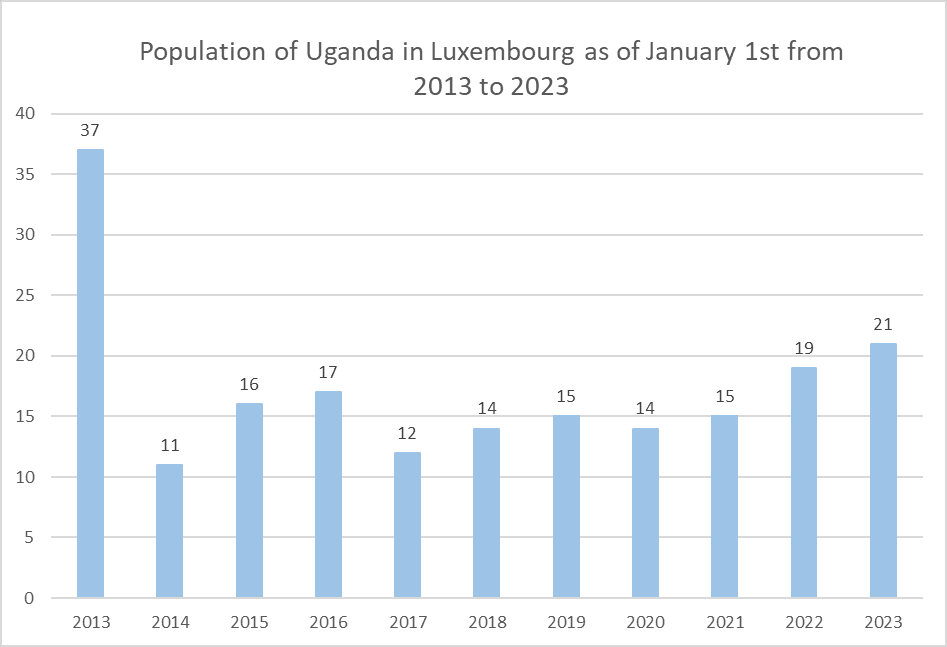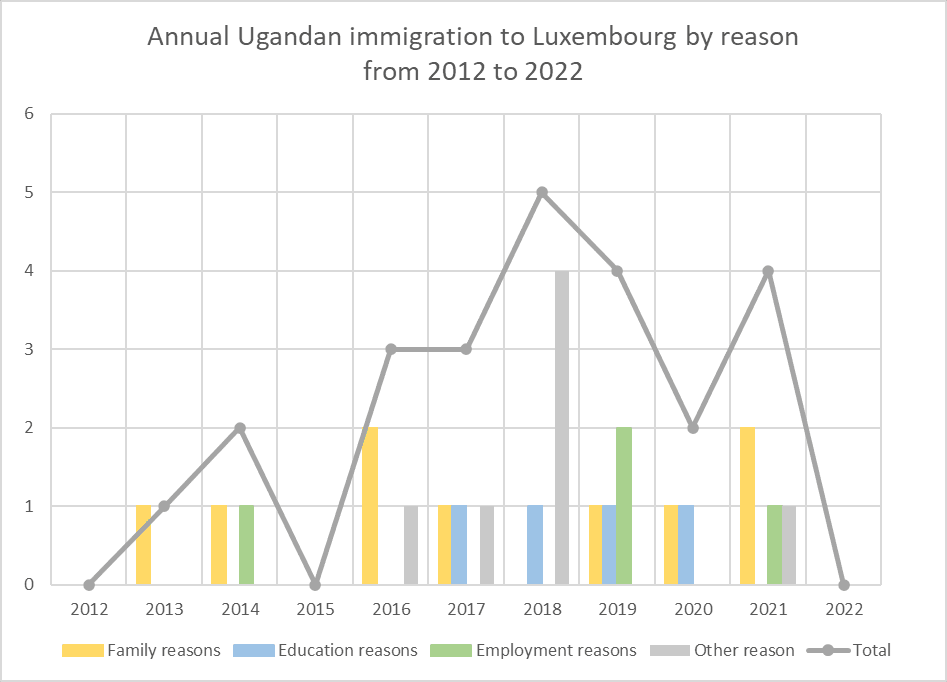
How to obtain a visa to Luxembourg for Ugandan nationals
If you are a Ugandan citizen, you will need a visa to visit Luxembourg regardless of the reason for your visit, be it tourism, study, work, or any other reason. Navigating through the intricate requirements, paperwork, and application procedures can feel overwhelming and complex, especially for first-time applicants. If you're seeking a Luxembourg working visa from Uganda or any other type of visa and find yourself at a loss, you've come to the right place.
Despite being the least populated country in the European Union, Luxembourg has emerged as a highly sought-after and multicultural destination, with nearly half of its population consisting of expatriates. However, immigration patterns vary, and Ugandan immigration to Luxembourg is quite limited. Each year, no more than five individuals arrive, with the Ugandan population in the country totaling just 21 individuals as of early 2023.
How many Ugandans live in Luxembourg?
In general, the Ugandan population in Luxembourg, as well as the influx of Ugandans each year, is minimal, largely due to the challenging socio economic situation in the country, which makes meeting immigration requirements nearly impossible. Despite this, there are some Ugandans settled in the country, and a few arrive each year, so let's review the statistics to find out precisely how many Ugandans live in Luxembourg, how many arrive each year, and what percentage they represent in relation to the total population and other foreign communities.

The Ugandan population in Luxembourg is minimal, with only 21 Ugandans in the country. The trend over the past few years shows a slight increase, particularly in the last four years, yet it is too slight to affirm real population growth. It's interesting to note that in 2013, there was a much larger population of 37 people, which then sharply declined the following year. Since 2014, the Ugandan population has nearly doubled, from 11 individuals to 21, but it has not reached the previous peak.
Another interesting aspect to analyze, in addition to the absolute number of Ugandans in the country, is how many arrive each year and their main motives. Between zero and five Ugandan individuals arrive annually for various reasons, including family, work, studies, or others, without an apparent pattern. It's worth noting that in 2022, no Ugandan citizens arrived in the country.

Total population
Regarding the percentage of the Ugandan population, it is very small. It represents only 0.003% of the total population and 0.007% of the foreign population in Luxembourg. In fact, the entire African population in Luxembourg is minimal. The majority of the foreign population in Luxembourg comes from the European Union. Portugal tops the list with an impressive figure of 92,101 citizens, followed by France with 49,104 citizens, Italy with 24,676 citizens, Belgium with 24,676 citizens, and Germany with 12,678 citizens.
Types of Luxembourg visas for Ugandans
When obtaining a visa for Luxembourg from Uganda, there are two main options depending on the duration and nature of the stay: short-stay visas and long-stay visas. Additionally, if the intended period of stay in Luxembourg is longer than one year, it will be necessary to apply for a residence permit, so we will also address this point and explore the types of residence permits available.
It's important to note that the types of Luxembourg visas available for Ugandan citizens, as well as the procedures for obtaining them, are the same as those for any non-European foreigner.
Official government site
You can find more information about short and long-stay visas on the government's dedicated page at guichet.lu.
Short-stay visas for Luxembourg
Those intending to enter the country for a brief period should apply for a short-stay visa, also known as a type C visa. This visa allows transit or stays in Luxembourg and the Schengen area for a maximum of 90 days within 180 days.
Long stay visas for Luxembourg
Individuals planning to stay in Luxembourg for more than three months must apply for a long-stay visa, also known as a type D visa. In many cases, this visa is a necessary preliminary step for those aiming to become residents in Luxembourg.
Long-stay visa is intended for
- Holders of a temporary residence permit.
- Holders of a work permit for paid employment.
- Those who are going to join a family member who is an EU citizen.
- Those who want to carry out any other type of activities such as self-employed work, studies, research, or sports activities.
Work permit
Before applying for a D visa, you must request a work permit from the Luxembourg Ministry of Foreign and European Affairs.
Luxembourg Residence permits for Ugandans
If you plan to live in Luxembourg for more than a year and wonder how to relocate to Luxembourg from Uganda, you must consider that the process goes beyond obtaining a visa. While obtaining a long-stay visa (type D visa) is necessary, it's only the first step; you also need to obtain a residence permit.
What is a titre de sejour?
Unlike a visa, a residence permit grants individuals the right to reside and engage in specific activities in Luxembourg for a more extended period. There are various types of residence permits based on the activities individuals plan to undertake in Luxembourg and their family relationships.
Some of the situations that have attached a specific resident permit or have a specific procedure include:
Each residence permit has its own set of requirements and procedures for application. These may include demonstrating specific qualifications, providing proof of employment or sponsorship, showing sufficient financial means, and adhering to the necessary documentation and administrative procedures.
Check our relocation guide for salaried workers

Application process for Luxembourg visa step-by-step
If you are wondering, how can I apply for a Luxembourg visa in Uganda, this section will answer your questions. We will guide you through the necessary steps to determine which type of visa you need and how to apply for it. The process involves crucial considerations such as deciding on the purpose of entry, gathering necessary documents, and finally submitting your visa application, so let's look at each step in more detail.
Decide on the grounds for entry
Clarifying the purpose of your entry into Luxembourg is the first step in the visa application process. There are different reasons for visiting Luxembourg, each requiring a specific type of visa and corresponding application procedures.
Tourist or family visits
Business entry to Luxembourg
Employment in Luxembourg as ground
Study related entry
Family reunification as entry ground
Private reasons as ground for entry
Collect the documents
Before proceeding with the visa application process, it's essential to ensure you have all the necessary documents in order. Collecting the required documents is a crucial step to demonstrate your eligibility and purpose of travel to Luxembourg. While the specific documents may vary depending on the type of visa and individual circumstances, there are general documents that are commonly required for most visa applications.
Below is a comprehensive list of the Luxembourg visa requirements for Uganda citizens; however, it's important to note that additional documents may be necessary depending on the specific nature of your case. Ensure thoroughness in assembling the following documents to strengthen your application and facilitate a smooth processing experience.


Piece of advice
Depending on the type of visa, especially for short-term tourist visas, you may need to show a travel itinerary. Although there is the option of getting the airline ticket, this option is certainly a risky bet, as you are not sure of many things, including whether you will get visa approval. So, instead of emptying your pocket on buying an actual ticket, a generally accepted option is to submit a flight itinerary reservation.
Apply for necessary papers to stay in Luxembourg
The application process differs depending on whether you're applying for a C visa or a D visa. In both cases, you'll need to visit the Luxembourg Embassy.
Unfortunately, there isn't a Luxembourg embassy in Uganda. Instead, you'll need to contact the Embassy of Belgium in Kampala, which acts as Luxembourg's diplomatic representation.
The website of the Luxembourg Ministry of Foreign and European Affairs provides a list of all Luxembourg embassies worldwide.
Applicaiton for a C visa
You must request an appointment at the Embassy of Belgium in Kampala, ensuring that the appointment day falls at least 15 days before the planned visit and no more than 6 months before it begins. On the day of the appointment, you'll need to personally bring all the required documents and submit your application.
Visa to Luxembourg
Application for a D visa
The process consists of two steps. First, you will need to apply for a temporary authorisation to stay, then submit a long-stay D visa application, when you are granted the approval of your stay from the Ministry.
This application is divided into three steps.
How long does it take to get a Luxembourg visa from Uganda?
Question of time
Applications for a Short-stay C visa are typically resolved within 15 days from the date of filing.
In Luxembourg, the processing time for short-stay C visas is normally completed within 15 days from the date of application. However, in certain circumstances, the process can take up to 30 or even 45 days.
On the other hand, the time taken to obtain a long-stay D visa in Luxembourg varies depending on the nature of the activities planned in the country. The processing time for these visas is determined accordingly.
Common reasons for visa rejection
Here are some key reasons why a visa application might be rejected. Take a careful look at these points to ensure the smooth processing of your application.






What to do if your visa got rejected unlawfully?
If your visa application is rejected, you can appeal the decision to the Administrative Tribunal. The appeal must be filed by a lawyer within 3 months from the notification of the resolution. You can find more information on how to proceed with this process on the government's dedicated page at guichet.lu.
How much it costs to get a visa to Luxembourg?
Finally, let's address a crucial detail: the Luxembourg visa price for Ugandas. The following table outlines the costs according to the type of visa. The cost of the visa will be determined based on the fees you need to pay in order to get it. A standard consular fee varies depending on the personal situation and status.
Besides, you will need to translate necessary documents, pay for the photos, and other visa-related expenses, but these costs are usually depending on your personal situation.
| Type of visa | Fee in EUR | Fee in UGS |
| Short-stay visa (C) | 90 | ~ 360 904 |
| Long-stay visa (D) | 50 | ~ 200 502 |
| Visa for children between the age of 6 and 12 | 45 | ~ 180 452 |
| Visa for children under 6 years of age and visas for pupils, students, and teachers accompanying them on school trips or educational study trips. | Free | Free |
| Visa for researchers going abroad to carry out scientific research. | Free | Free |
| Visa for representatives of non-profit making organizations aged 25 years at most who participate in seminars, conferences, or sports, cultural or educational events. | Free | Free |
| Visa for family members of an EU/EEA national | Free | Free |
Prices have changed
In June 2024, the fee for a Schengen visa increased. The revenue generated from visa applications will be reinvested to provide more resources, including staff, to process visa applications. This should reduce the waiting time for a Schengen visa appointment.
Application for a residence permit in Luxembourg for Ugandans
If you plan to stay in Luxembourg for an extended period, you'll likely need to apply for a residence permit in addition to the long-stay D visa. This process involves three additional steps.
Within 3 days of arriving in Luxembourg, you must submit an arrival declaration to the municipal authorities of your residence. Required documents include:
- A valid ID (passport, visa, or residence permit issued by another EU member state);
- The long-stay visa;
- A proof of address (such as a lease agreement or utility bill).
Keep the receipt
Upon submission, you'll receive a copy of the declaration as confirmation. You will need to send it with your package of documents for the Residence Permit.
The next step is to undergo a medical examination promptly, which comprises two tests:
Upon receiving the results, the Health Inspection of the Ministry of Health will issue a medical certificate and send it to the Immigration Department of the Ministry of Foreign and European Affairs for the residence permit application approval.
The application for a residence permit must be submitted within 3 months of arriving in Luxembourg to the Immigration Department of the Ministry of Foreign and European Affairs. This can be done online through MyGuichet.lu or by mail by sending the residence permit application form to the Ministry of Foreign and European Affairs.
In both cases the following documents will be required:
- Copy of the passport;
- Copy of the visa;
- Copy of the declaration of arrical, issued by the commune office;
- Proof of suitable accommodation, such as a lease agreement, property deed, or other relevant documents;
- Proof of a 80 euros fee payment to the account IBAN LU46 1111 2582 2814 0000 (BIC: CCPLLULL, beneficiary: Ministry of Foreign and European Affairs, Immigration Department; communication: residence permit for...).
What happens after application?
Upon approval, the applicant will receive a letter inviting them to schedule an appointment at the Immigration Department for a photo session and fingerprinting, which will be incorporated into the residence permit.
A few days after providing biometric data, the applicant will receive a notice to personally collect their residence permit card.
Frequently Asked Questions (FAQ)
What types of visas are available for Ugandan nationals traveling to Luxembourg?
Ugandan nationals traveling to Luxembourg can apply for different types of visas depending on the purpose and duration of their visit. These may include short-stay visas (Type C) for visits lasting up to 90 days, long-stay visas (Type D) for stays exceeding 90 days and up to 1 year. For longer periods it’s necessary to ask for a long-stay visa and then apply for a residence permit.
Can I appeal a visa rejection decision?
How much does it cost to obtain a Luxembourg visa for Ugandan nationals?
Can I travel to other Schengen countries with a Luxembourg visa?
Source: statistiques.public.lu, guichet.public.lu, guichet.public.lu, guichet.public.lu, mae.gouvernement.lu, www.netherlandsandyou.nl, guichet.public.lu, guichet.public.lu, guichet.public.lu, guichet.public.lu, guichet.public.lu, guichet.public.lu, guichet.public.lu, uganda.diplomatie.belgium.be
We took photos from these sources: Robin Kutesa on Unsplash, self-made graphs with information from statistiques.public.lu and Eurostat